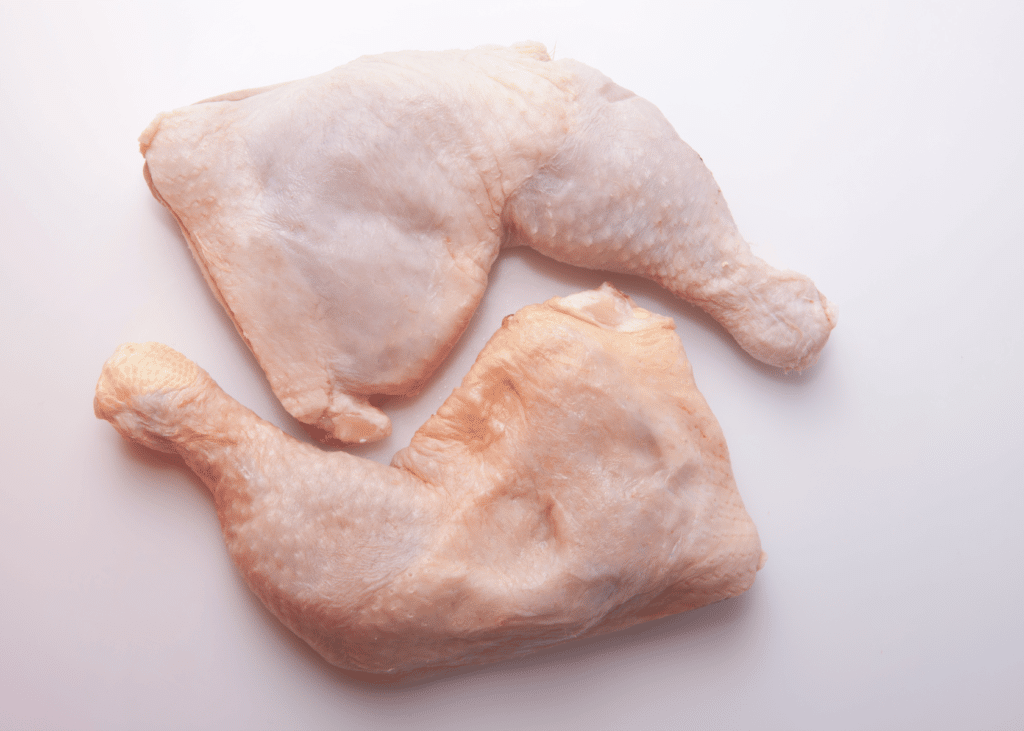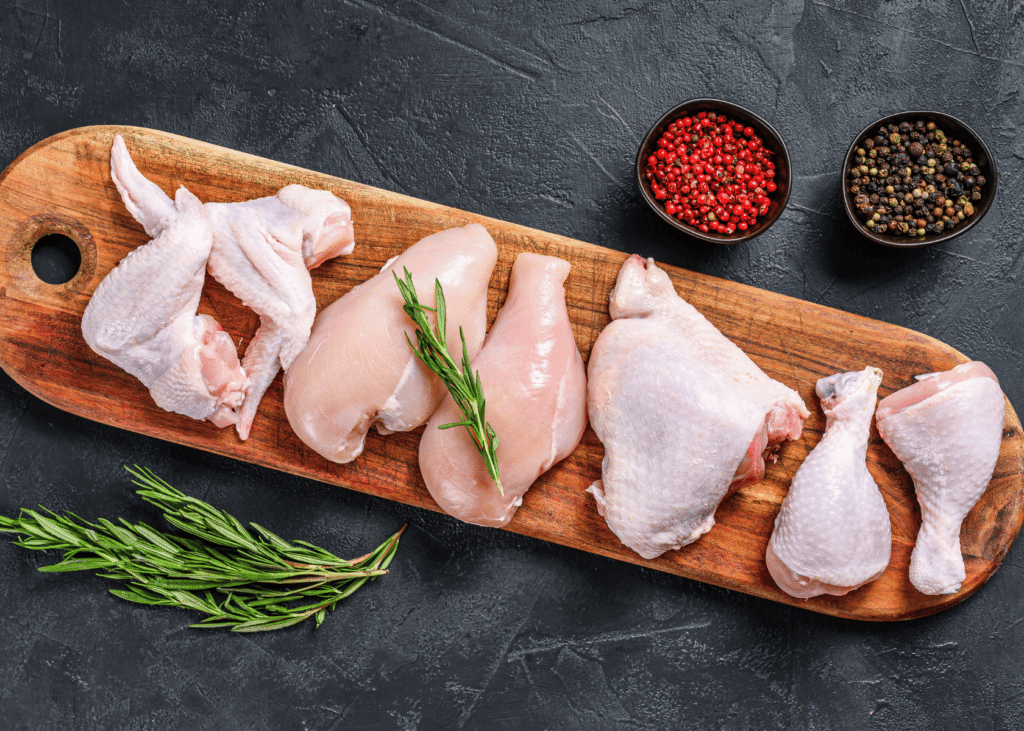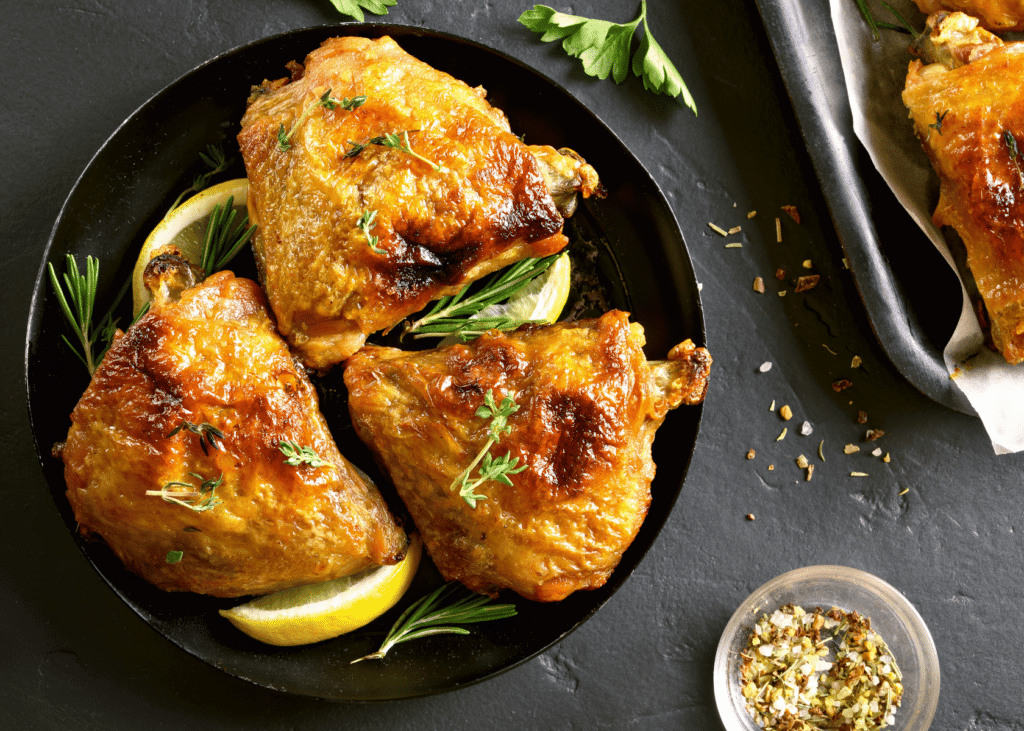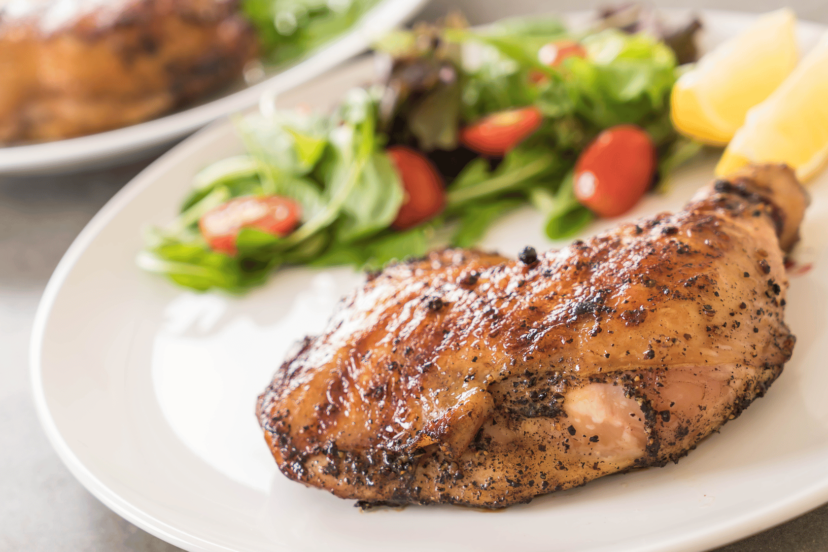How to Cut Chicken Thighs? Mastering the Art!
Ever struggled with the daunting task of properly cutting chicken thighs? Believe me, I’ve been there too. In fact, it’s a common hurdle for many home cooks that inspired me to hone my poultry preparation skills and do some serious research on the matter.
This article aims to be your ultimate guide, offering clear step-by-step instructions and expert tips on how to cut chicken thighs like a pro. Come along – let’s conquer the kitchen together!
Table of Contents
Key Takeaways
- Properly deboning chicken thighs involves locating the bone along its length and cutting as close to it as possible without piercing through, then scraping away any remaining meat.
- Trimming excess fat from chicken thighs before cooking improves taste and texture by reducing grease and allowing seasonings to penetrate more evenly.
- Slicing chicken thigh meat against the grain and using a sharp knife ensures tenderness and clean cuts.
- Different cooking methods for chicken thighs include grilling, roasting, braising, and frying. Cook them to an internal temperature of 165°F (74°C) for safety.
- Expert tips include using a sharp knife for clean cuts, trimming fat for flavor or leaner options, properly browning the outside of the thighs for moisture retention, avoiding overcrowding the pan while cooking, and using an instant-read thermometer to ensure proper doneness.
- Safety measures involve practicing good hygiene when handling raw chicken by washing hands thoroughly before and after touching it, using separate cutting boards to prevent cross-contamination, cleaning utensils that come into contact with raw chicken properly,
Steps for Cutting Chicken Thighs
To properly cut chicken thighs, first debone the thigh by locating the bone and cutting along its length. Then, trim any excess fat from the thigh before slicing it into desired pieces for cooking or recipes.
Deboning the Thigh
Deboning a chicken thigh is a skill that is easy to master. To begin how to cut chicken thighs, place the chicken thigh on the cutting board skin-side down to locate the bone running along its length. Here are the steps to debone it:
- Start at one end of the thigh bone and run your knife along it, cutting as close as possible without piercing through with your knife.
- Flip open the meat once you’ve made an initial cut into it, exposing more of the bone.
- Use your knife to scrape away any remaining meat clinging onto the bone.
- Repeat this process on both sides until you are able to completely free up the bone from the meat.
- Finally, pull out and discard the bone, leaving behind a perfectly deboned chicken thigh ready for trimming and cooking.
Trimming the Meat
To prepare the chicken thighs for cooking, you’ll need to trim any excess fat or skin. Here’s how to do it:
- Start with a sharp knife and a clean cutting board.
- Place the chicken thigh skin – side down on the cutting board.
- Grab hold of any loose pieces of fat or skin and trim them off with your knife.
- Be careful not to cut too deeply into the meat – you just want to remove the excess fat and skin.
- If there are any large sections of fat that are difficult to remove, use your knife to carefully scrape them away.
- Once you’ve trimmed off the excess fat, flip the chicken thigh over and repeat the process on the other side.
Slicing the Meat

To slice the meat of chicken thighs, follow these simple steps:
- Place the deboned and trimmed chicken thigh on a cutting board.
- Hold the chicken thigh firmly with one hand to prevent it from moving.
- Using a sharp knife, make smooth, even slices across the grain of the meat.
- Aim for slices that are approximately 1/4 to 1/2 inch thick for optimal cooking and tenderness.
- Continue slicing until all the chicken thigh meat is cut into desired slices.
Cooking Chicken Thighs
When finding out how to cut chicken thighs, there are various methods you can choose from to achieve delicious results.
Different Cooking Methods
When it comes to cooking chicken thighs, there are several different methods you can use. Here are some popular cooking methods for delicious and flavorful chicken thighs:
Grilling
Grilling chicken thighs gives them a smoky and charred flavor. Preheat your grill to medium-high heat and lightly oil the grates. Season the chicken thighs with your favorite rub or marinade, then place them on the grill. Cook for about 6-8 minutes per side, or until the internal temperature reaches 165°F (74°C).
Roasting
Roasting chicken thighs in the oven is an easy and hands-off method. Preheat your oven to 425°F (220°C). Season the chicken thighs with salt, pepper, and any other desired spices or herbs. Place them on a baking sheet lined with parchment paper or aluminum foil, skin-side up. Roast for about 30-35 minutes, or until the skin is crispy and golden brown.
Braising
Braising involves cooking chicken thighs slowly in a liquid to create tender and flavorful meat. Start by browning the chicken thighs in a skillet over medium-high heat until they develop a golden crust. Remove them from the skillet and set aside. In the same skillet, sauté onions, garlic, and any other desired vegetables until softened.
Add broth or a mixture of broth and wine to deglaze the skillet, then return the chicken thighs to the pan. Lower the heat to low, cover, and simmer for about 45 minutes to 1 hour until the meat is tender.
Frying
If you’re looking for crispy and indulgent chicken thighs, frying is a great option. Heat vegetable oil in a deep skillet or Dutch oven over medium-high heat until it reaches about 350°F (175°C). In a shallow dish, combine flour with your favorite seasonings such as paprika, garlic powder, salt, and pepper.
Dredge the chicken thighs in the seasoned flour, shaking off any excess. Carefully place them in the hot oil, skin-side down, and fry for about 6-8 minutes per side, or until golden brown and cooked through.
Tips for Cooking Chicken Thighs
When it comes to how to cut chicken thighs, there are a few key tips that can help ensure you end up with delicious and flavorful results. First, season your chicken thighs generously with your favorite spices or marinade.
This will infuse flavor into the meat as it cooks. Secondly, make sure to properly brown the outside of the chicken thighs before continuing with your chosen cooking method. This not only adds a nice caramelized crust but also helps seal in the juices for moist and tender meat.
Additionally, avoid overcrowding the pan when cooking chicken thighs. If you’re working with a large batch, cook them in batches to prevent overcrowding which can result in steaming instead of browning.
Finally, use an instant-read thermometer to accurately determine if your chicken thighs are cooked through. The internal temperature should reach 165°F (75°C) to ensure they are safe to eat.
Expert Tips

In this section, we will share expert tips on cutting chicken thighs and answer common questions about the process. Our experts recommend using a sharp knife to ensure clean cuts and always trimming any excess fat for a healthier dish.
Don’t forget to properly debone the thighs if needed, following our step-by-step instructions. If you have any specific questions about cutting chicken thighs or need advice on different preparation methods, check out our Q&A below!
Expert advice on cutting chicken thighs
As an expert in cutting chicken thighs, I can provide valuable advice to ensure you achieve the best results. When it comes to cutting chicken thighs, it is crucial to start with a sharp knife.
This allows for clean and precise cuts, minimizing the risk of accidents. Additionally, always trim any excess fat from the thighs before slicing or deboning them. Removing the fat not only improves the taste but also helps prevent flare-ups during cooking.
Remember that when deboning chicken thighs, you should start by laying them skin-side down on your cutting board and locating the bone running along their length. By following these tips and focusing on technique, you’ll be able to cut chicken thighs like a pro and elevate your culinary skills in no time.
Common questions about cutting chicken thighs
One common question people have about cutting chicken thighs is whether or not to trim the fat. Trimming the fat from chicken thighs is a personal preference and can depend on your dietary choices.
If you prefer leaner meat, it’s recommended to remove excess fat by gently lifting the skin and skimming scissors across the chicken’s surface to find any visible fat. However, keep in mind that some chefs and home cooks enjoy leaving a bit of fat for added flavor during cooking.
Ultimately, it’s up to you and your taste preferences.
Safety and Hygiene Tips
Ensure proper hygiene when handling raw chicken by washing your hands thoroughly before and after touching the meat.
Best practices for handling raw chicken
Handling raw chicken requires proper hygiene and safety practices to prevent the spread of bacteria and ensure food safety. Here are some best practices to follow when learning how to cut chicken thighs:
- Wash hands thoroughly before and after handling raw chicken to avoid cross – contamination.
- Use a designated cutting board for raw chicken and separate it from other ingredients to prevent cross-contamination.
- Clean and sanitize all utensils, knives, and surfaces that come into contact with raw chicken.
- Store raw chicken in a leak – proof plastic bag or container on the bottom shelf of the refrigerator to prevent juices from dripping onto other foods.
- Avoid washing raw chicken as it can spread bacteria through splashing water droplets.
- Use disposable gloves when handling raw chicken if desired, but still remember to wash hands before and after glove use.
- Discard any marinades or sauces that have come into contact with raw chicken unless they will be cooked properly.
- Cook chicken thoroughly until it reaches an internal temperature of 165°F (74°C) to kill any harmful bacteria present.
- Refrigerate or freeze leftover cooked chicken within two hours of cooking to prevent bacterial growth.
Proper knife handling techniques
When cutting chicken thighs, it’s essential to follow proper knife handling techniques to ensure safety and efficiency. Here are some key tips to keep in mind:
- Grip the knife firmly: Hold the handle of the knife with a secure grip, ensuring that your fingers wrap around it comfortably. This will provide stability and control while cutting.
- Use a sharp knife: A dull knife can be dangerous as it requires more force to cut through the meat. Always use a sharp knife, which will not only make the process easier but also reduce the risk of accidents.
- Maintain a steady cutting motion: When slicing or deboning chicken thighs, maintain a smooth and consistent cutting motion. Avoid applying excessive force or using jerky movements, as this can lead to uneven pieces or potential injuries.
- Cut away from your body: To prevent accidental cuts, always direct your cuts away from your body. This helps minimize the possibility of injuries if the knife slips or slides during the process.
- Keep fingers clear of the blade: Ensure that your fingers are positioned safely away from the path of the blade while cutting chicken thighs. Curling your fingertips inward and using a claw-like grip on the meat can help protect against accidental cuts.
- Watch out for bones: When deboning chicken thighs, be cautious while working around bones. Take note of their location and use gentle motions to maneuver around them without damaging surrounding meat.
Frequently Asked Questions

1. What is the best way to cut chicken thighs?
The best way to cut chicken thighs is by using a sharp knife and following these steps: Start by removing any excess fat or skin, then determine whether you want bone-in or boneless pieces. For bone-in, locate the joint between the thigh and drumstick and make an incision through it. For boneless, slice along the natural seam between the meat and bone until fully separated.
2. How should I handle raw chicken while cutting it?
When handling raw chicken, it’s important to follow proper food safety practices. Always wash your hands thoroughly before and after handling raw poultry, use separate cutting boards for poultry and other ingredients, clean all surfaces that come into contact with raw chicken with hot soapy water, and avoid cross-contamination by not reusing utensils or plates that have touched raw poultry.
3. What are some recipe ideas that require diced chicken thighs?
Diced chicken thighs can be used in various recipes such as stir-fries, curries, stews, kebabs, salads, pasta dishes, tacos, enchiladas, casseroles,and more. Their dark meat provides a richer flavor compared to breast meat.
4. Can I use kitchen shears instead of a knife to cut chicken thighs?
Yes! Kitchen shears can be a useful tool for cutting through bones or trimming excess fat from chicken thighs. They offer better control in certain situations but always ensure they are sharp enough for easy usage
Conclusion
In conclusion, learning how to cut chicken thighs is a valuable skill that can enhance your cooking abilities and save you money. By following the step-by-step instructions provided in this article, you can confidently debone, trim, and slice chicken thighs with ease.
Whether you are preparing them for grilling, roasting, or frying, mastering the art of cutting chicken thighs will elevate your culinary creations to new heights. So sharpen those knives and get ready to impress with perfectly prepared chicken thigh dishes!
*We may earn a commission for the purchases made using our links. Please see our disclosure to learn more.




